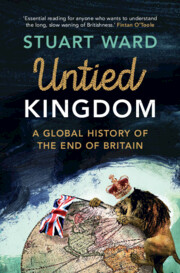3 results

Untied Kingdom
- A Global History of the End of Britain
-
- Published online:
- 16 February 2023
- Print publication:
- 16 February 2023
Introduction
-
- Book:
- Untied Kingdom
- Published online:
- 16 February 2023
- Print publication:
- 16 February 2023, pp 1-18
-
- Chapter
- Export citation
Conclusion
- from Part III - Repercussions
-
- Book:
- Untied Kingdom
- Published online:
- 16 February 2023
- Print publication:
- 16 February 2023, pp 480-489
-
- Chapter
- Export citation

